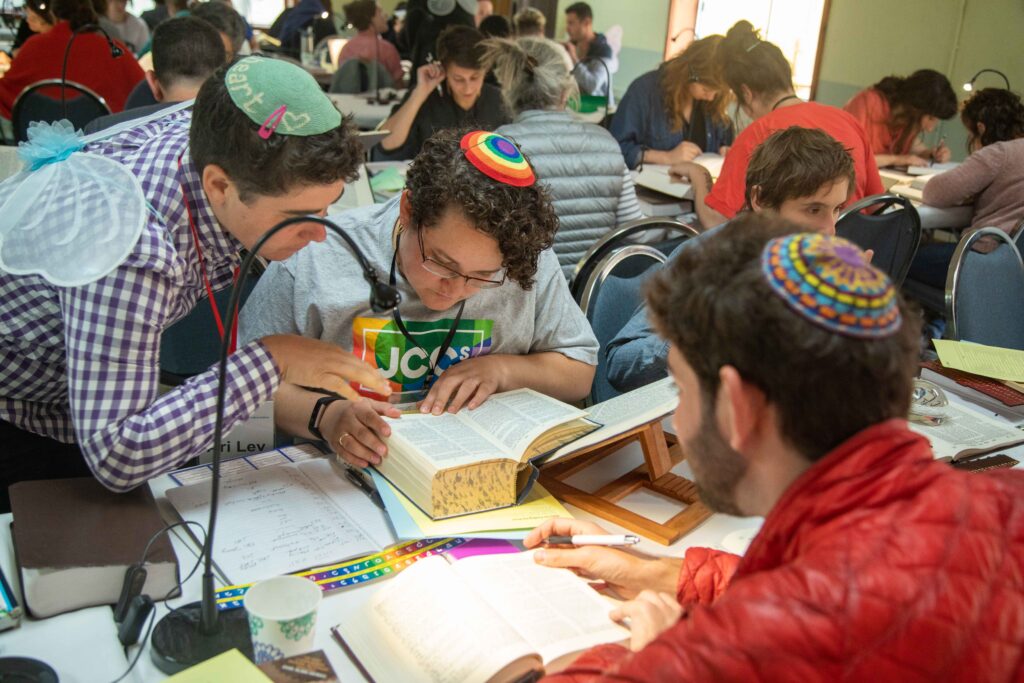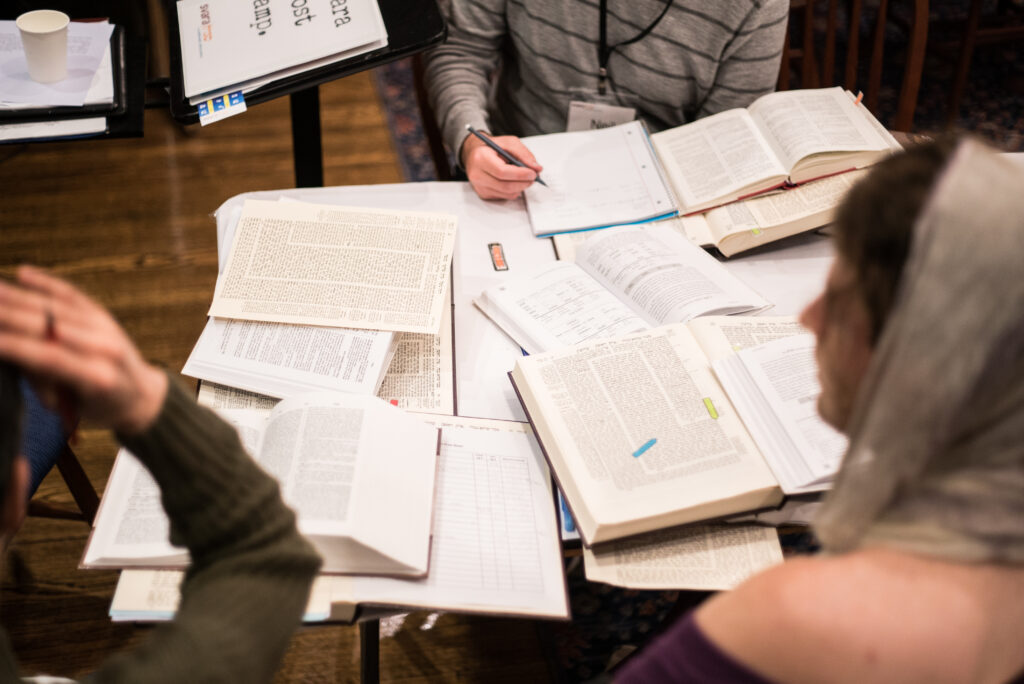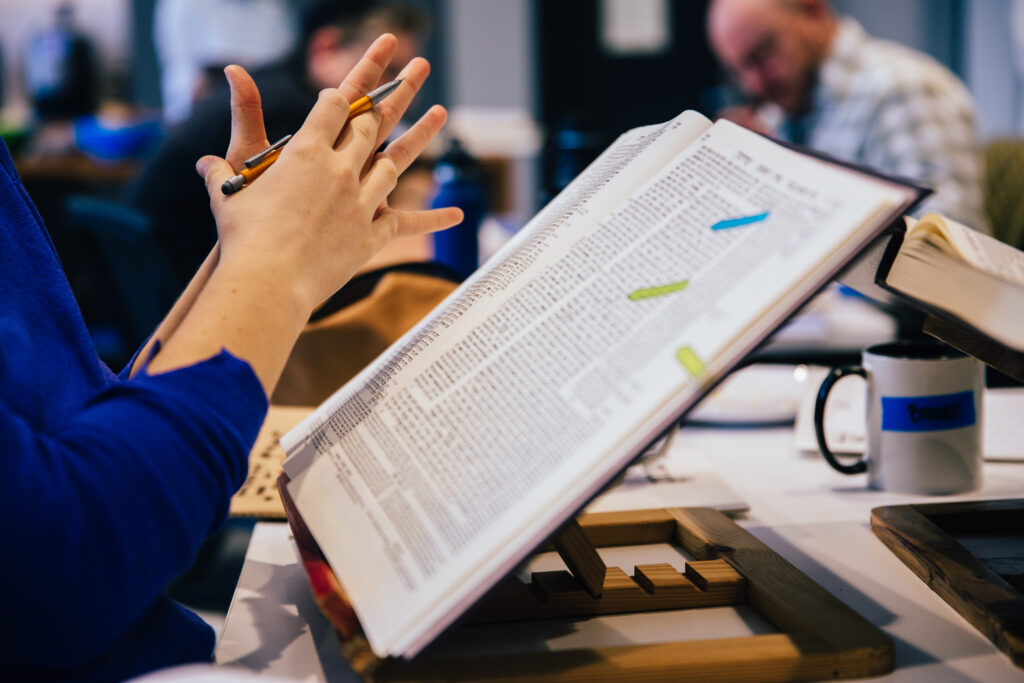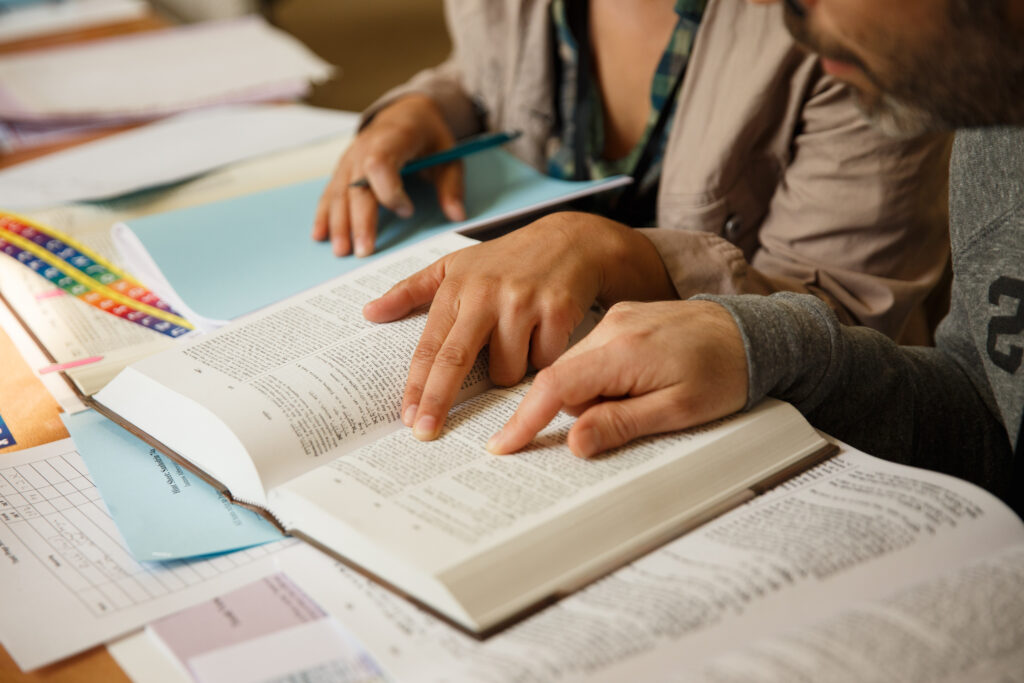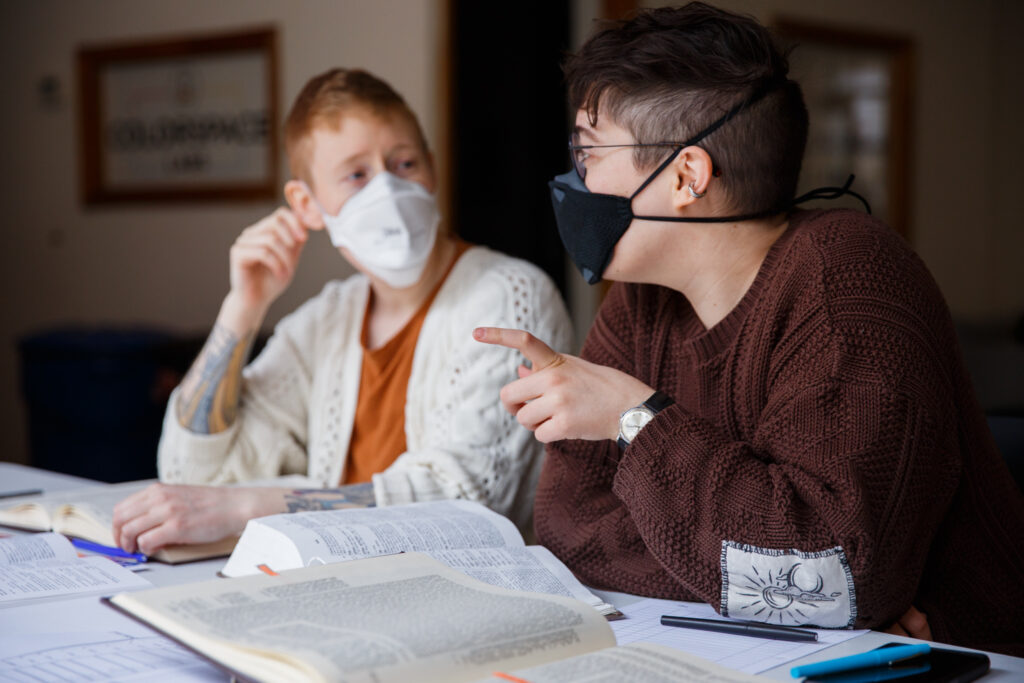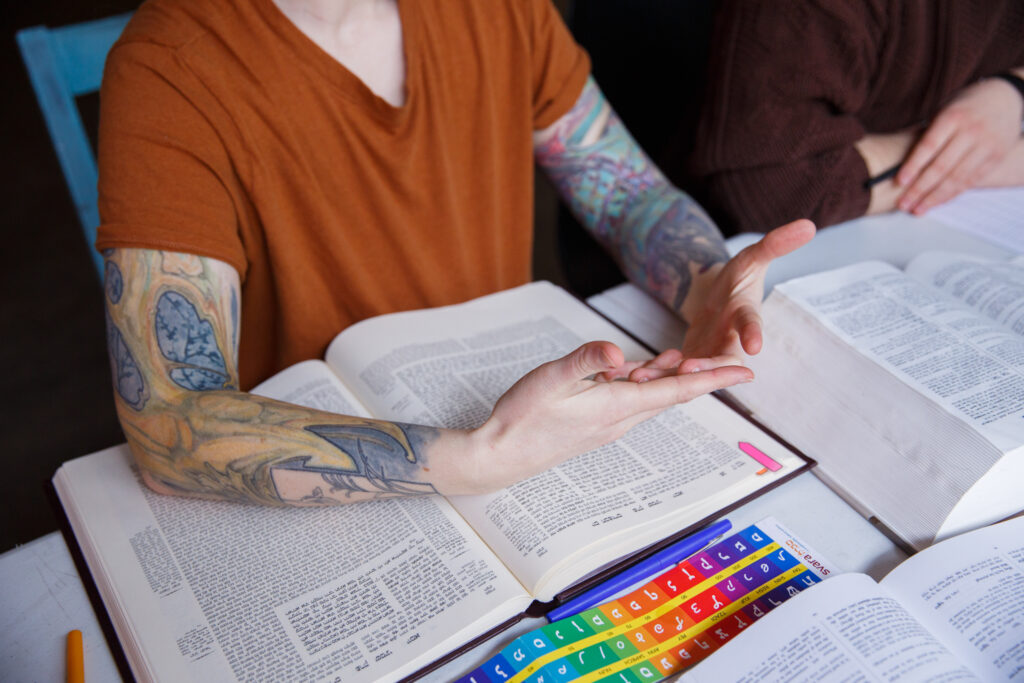We have heard from y’all time and time again that the most powerful, connected moments of learning happen when we are able to show up with our whole selves, and when we can see ourselves reflected in our teachers and comrades. Our yeshiva aspires to create the learning conditions that hold and recognize *all* of who we are, where we can show up fully and know that who we are is exactly all we need in order to take charge of the tradition and make it our own. We know that our Torah is partial and fragmented until it is informed by the wisdom of *all of us,* and especially those of us who have been kept outside of learning spaces because of our gender, our sexuality, our ability, our racial identity, or our political commitments.
Last week, eJewish Philanthropy published “The Kranjec Test,” a call for the “inclusion of non-male voices, including transwomen [sic] and gender queer [sic] people, in our teaching and curricula” by demanding that source sheets “with more than two sources must include at least one non-male identified voice.” We feel excited and joyful by a long overdue call to scholars, teachers, and educators to allow their teaching to be shaped by the wisdom of those whose daily lived experiences are not reflected in our community’s patriarchal system. As we commend our colleagues’ call to action, we wonder: What work is needed to enable our community to truly “reimagine whose wisdom we teach”?
As the Kranjec Test generated powerful conversations, our hearts broke as we read reflections from colleagues and teachers who remarked that meeting the parameters of this test can only be realized through the incorporation of non-Jewish voices and texts, rather than an outcry about the lack of spaces where women, non-binary, and transgender Jews can learn Torah as their whole selves.
Why is it so difficult for our community to curate Torah resources that emerge from the unique experiences of transgender Jews? What are the conditions within and beyond our community that continue to perpetuate the lack of access to Torah shaped by women, non-binary, and transgender Jews? If the Kranjec Test is about “expanding our learning, emboldening our teaching, and reimagining what we think of as ‘core Jewish wisdom,’” we must not only invest in the transformation of our source sheets and curricula, but also in a transformation of how and where Torah is grown, produced, and developed in our communities—and, perhaps most centrally, by whom.
The Kranjec Test echoes Judith Plaskow’s monumental work Standing Again at Sinai, reminding us of the partiality of revelation. In Plaskow’s words, “I call Torah the record of part of the Jewish people because the experience and interpretation found there are for the most part those of men” (p. 33, 1990). The Kranjec Test as a call to action demands that we recognize and grapple with the ways in which the sacred Torah that lives and thrives in our communities is fundamentally partial, shaped by the voices of men and informed by male-ness as a default. In his own response to the Kranjec Test last week, Rabbi Micha’el Rosenberg also raised the theme of partial revelation:
Committing to including sources written by non-binary folks and women means more work for all of us; it means getting used to what, at first, will feel like strange boundary crossing; it means we have to be wary of the risk of inflexibly viewing different genres as differently gendered, while we wait for the genres of traditionalist commentary and responsa to catch up on the gender front. But most threateningly, it means acknowledging that our Torah is not whole, that it too has suffered from the onslaught of patriarchy, and that it’s therefore not yet all that it must be. That’s what scares me most about the Kranjec test, but it’s also why I realize I must, sooner rather than later, commit to it.
As he notes, upholding the Kranjec Test is a difficult task. When we adhere to these requirements in their fullness by expanding them to include specifically trans and non-binary voices, the difficulty is even more pronounced. While the solution of many to incorporate non-Jewish poetry and secondary sources written by women to enhance and change our Torah is a powerful one (and does indeed beautifully expand our canon!), that move—as Rosenberg points out—relegates trans and non-binary perspectives to sources that are “beyond” the canon, outside of the framework of Torah rather than locating them as primary sources of Torah. We cannot simply “wait for the genres of traditionalist commentary to catch up…on the gender front.” We must see ourselves as responsible for investing in the new conditions that will allow the deep, authentic Torah that emerges from the unique perspective of trans and non-binary people to flourish.
Our conversations about incorporating more non-male voices onto our source sheets and into our curricula must grapple with the systemic lack of access to nourishing, nurturing spaces for transgender people to engage in robust, rigorous, affirming learning. Simply put, our community must invest in the transformation of Torah by—and for!—transgender people, non-binary people, and women. What is needed is not just a re-imagining of what is on a source sheet or a syllabus. To be sure, our syllabi and source sheets must be transformed. But we also need to reimagine the bet midrash itself: what it is, who can enter, who is at the front of the room, what is learned there, how is it learned, and why. And just as we and the work of the Kranjec Test address these questions with regard to gender, they must also be confronted with regard to ability, race, and class as we work to nurture a Torah that is truly whole.
Each day in the bet midrash at SVARA we teach from what might be considered the ultimate patriarchal source sheet: a daf of Talmud. Or a slide of untranslated mishnah, or a verse of Torah. It is not the text on the page that makes our learning feminist or liberatory. It is the way in which we—as queer and trans teachers and learners—are invited to show up to the text. Through SVARA’s Teaching Kollel, we actively nurture a learning environment that—for the first time in history (that we know of!)—exclusively lifts up the training of queer and trans Jews to become shapers and transmitters of Talmud, our foundational source sheet. We learn in a way that centers our insights as essential in the unfolding canon of Jewish tradition, and we nurture that sensibility in our learners.
Authentic inclusion of non-male voices requires an investment in the scholarship of trans and non-binary people, alongside a commitment to eradicating and uprooting the obstacles facing trans folks as they pursue learning that would empower and equip them to shape this Torah. This learning is happening. This missing and silent Torah is being uncovered, and this Torah is one essential piece of what is needed to help make our tradition more whole.
As educators and leaders in the Jewish community strive to “pass” the Kranjec Test, we ask that we—collectively and individually—commit to changing the conditions that contribute to making the Kranjec Test so difficult to achieve in its fullness:
- Invest in learning spaces and opportunities for transgender people, non-binary people, and women.
-
- Financially, materially, support opportunities that enable trans folks to learn. Invest resources in communities of study which center and nurture the Torah that emerges from the experiences of trans folks, non-binary folks, and women.
- Prioritize the Oral Torah—the lived experiences of transgender people, non-binary people, and women.
-
- Resist the urge to exclusively prioritize the written word (publications, books, academic articles). When we look for pull-quotes that can be placed on source sheets, we can miss out on the vibrant, dynamic living Torah that our community members can offer, and it can lead us to ignore the obstacles that trans people, and non-binary people—alongside folks holding other marginalized identities—face in sharing, spreading, and being recognized for their Torah.
- Lift up the experiences of transgender folks, non-binary people, and women in your community. Invite community members to share their insights, reflections, reactions, and experiences, and compensate them for the Oral Torah that they are offering.
- When identifying and centering the voices of women, ensure that trans women are among those centered and uplifted.
In the spirit of the Kranjec Test, may we expand our learning, embolden our teaching, and work tirelessly to ensure that the space is created for Torah to be revealed with as many faces as possible.


